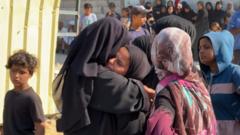Israel's Defense Forces (IDF) have declared their intention to facilitate humanitarian corridors for aid delivery into Gaza, marking a shift in their approach amidst growing global calls for increased assistance.
Israel to Create Humanitarian Corridors for Gaza Amid Aid Decrease

Israel to Create Humanitarian Corridors for Gaza Amid Aid Decrease
Israeli Defense Forces announce plans for humanitarian aid distribution as pressure mounts from the international community.
In a statement issued on Saturday, the IDF confirmed the establishment of these corridors and the resumption of aerial drops of humanitarian supplies into the besieged region. The initial air drop involved seven pallets of essential items including flour, sugar, and canned goods, sourced from international organizations. This announcement arrives as the international community intensifies its demands for Israel to permit more aid into Gaza, where humanitarian organizations have reported alarming rates of malnutrition and starvation, with recent reports detailing deaths attributed to food scarcity.
The IDF emphasized that it is implementing measures aimed at enhancing humanitarian efforts within the Gaza Strip and is open to temporarily halting military operations in areas with dense civilian populations. They refuted allegations of deliberate starvation amid growing evidence to the contrary. Furthermore, the IDF revealed it has reinstated power supply to a critical desalination facility in Gaza, expected to benefit around 900,000 residents.
International bodies, including the UN, alongside various aid organizations and some of Israel's traditional allies, have criticized Israel for its role in the humanitarian crisis, advocating for unfettered access and delivery of relief supplies to those in need. The IDF stated that the responsibility for food distribution within Gaza rests with the UN and international humanitarian organizations, who must guarantee that aid is not diverted to Hamas.
Since halting supply lines to Gaza at the beginning of March and imposing fresh restrictions in May, Israel maintains that sufficient food aid has been provided throughout the ongoing conflict, attributing the humanitarian suffering to actions by Hamas. The Hamas-run health ministry in Gaza has reported that over 125 individuals have succumbed to malnutrition, with 85 of those being children, as concerns over the humanitarian situation continue to escalate.
The IDF emphasized that it is implementing measures aimed at enhancing humanitarian efforts within the Gaza Strip and is open to temporarily halting military operations in areas with dense civilian populations. They refuted allegations of deliberate starvation amid growing evidence to the contrary. Furthermore, the IDF revealed it has reinstated power supply to a critical desalination facility in Gaza, expected to benefit around 900,000 residents.
International bodies, including the UN, alongside various aid organizations and some of Israel's traditional allies, have criticized Israel for its role in the humanitarian crisis, advocating for unfettered access and delivery of relief supplies to those in need. The IDF stated that the responsibility for food distribution within Gaza rests with the UN and international humanitarian organizations, who must guarantee that aid is not diverted to Hamas.
Since halting supply lines to Gaza at the beginning of March and imposing fresh restrictions in May, Israel maintains that sufficient food aid has been provided throughout the ongoing conflict, attributing the humanitarian suffering to actions by Hamas. The Hamas-run health ministry in Gaza has reported that over 125 individuals have succumbed to malnutrition, with 85 of those being children, as concerns over the humanitarian situation continue to escalate.


















